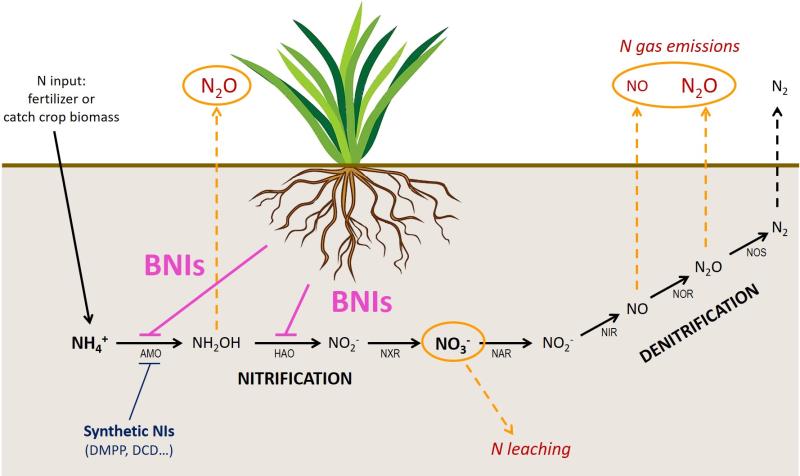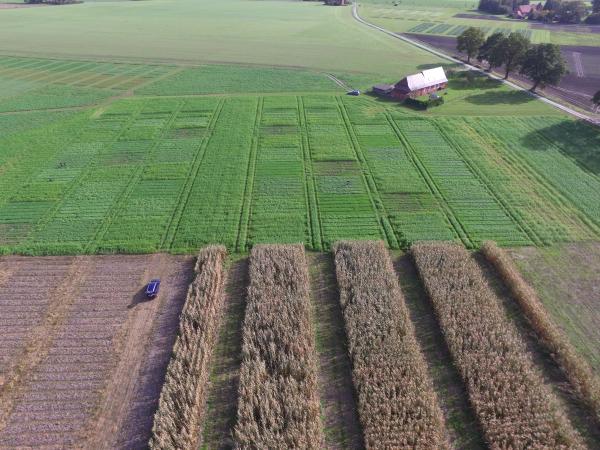Improved nitrogen use efficiency in agriculture by CATCH crops as producers of Biological Nitrification Inhibitors

Source: Izargi Vega-Mas
Agrosystems in industrialized countries are confronted with important challenges: they are facing increasing food demand while they are requested to reduce external inputs and to minimize negative environmental impact. The widespread use of synthetic nitrogen (N) fertilizers has promoted the productivity and profit in agricultural plant production. However, due to the low nitrogen use efficiency (NUE) of crop plants, the intensive use of N fertilizers entails losses from the plant-soil system via NO3-leaching and/or N gas emissions, leading to soil, water and atmosphere pollution. Strategies aiming at optimizing the management of N fertilization and reducing N losses to the environment have the potential to provide a significant contribution to UN Strategic Development Goals (SDGs) dealing with global warming (SDG13), responsible production (SDG12), clean water (SDG6) and biodiversity (SDG15). In the CATCH-BNI project, we will investigate the potential of catch crops to provide key functions and services in the regulation of N cycling in conventional and organic agrosystems. The nitrification processes operated by soil bacteria and archaea lead to the rapid conversion of ammonium into nitrate which is prone to losses that subsequently pollute the environment. Nitrification is also associated with the production of greenhouse gases (NOx), a GHG emitted as well by dentrification. While chemical inhibition of nitrification has emerged as a tool to limit nitrate losses, several plant species were lately shown to display nitrification inhibiting activities, mostly through release of organic compounds present in their root exudates. Those compounds are named Biological Nitrification Inhibitors (BNIs). The characterization and use of BNIs allow the transfer of the nitrification inhibition strategy to organic production systems and also represents a low-cost alternative to the application of chemical inhibitors. Catch crops do alter nitrifying microbial communities when incorporated into soil before sowing the target crop. Indeed, tissues from certain plant species accumulate compounds with BNI activities during their development. Their use as green manure has been hypothesized to improve soil fertility and concomitantly provide compounds that reduce the speed of nitrification. This is for example the case for glucosinolate-containing plant tissues from mustard or rapeseed (Brassicaceae family), for which a greater accumulation of NH4+ was observed in soils amended with their tissues. In the CATCH-BNI project we will investigate the incorporation of catch crops with BNI potential into crop rotations as a mitigation strategy to slow down nitrification processes and retain ammonium in soils as well as to increase soil N pools for the subsequent target crop.

Source: Nicolaus von Wiren
The main objective of the CATCH-BNI project is to design innovative approaches enabling the slow and controlled conversion of ammonium into nitrate in soils for optimal nutrition of target crops. For this, we aim at: 1) identifying catch crop plant species and/or cultivars with BNI activities in their root exudates and/or root and shoot tissues; 2) understanding how efficiently the N cycle is impacted by the use of BNI-producing catch crops and how the target crops perform (yield and NUE); 3) determining the best options and modalities to stabilize organic fertilizers with BNI plant material and 4) validating in real-field conditions the proposed innovations.

Source: Hervé Vanderschuren
Prof. Hervé Vanderschuren
Gembloux Agro-Bio Tech, University of Liège, BELGIUM
Email: herve.vanderschuren@uliege.be

Source: Cécile Thonar
Prof. Cécile Thonar
Agroecology Lab, Université Libre de Bruxelles, Brussels, BELGIUM
Email: cecile.thonar@ulb.be
Prof. Nicolaus von Wiren
Leibniz Institute of Crop Genetics and Crop Plant Research, GERMANY
Prof. Tony Miller
John Innes Centre, UK
Dr. Maria Begona
University of the Basque Country, SPAIN
Dr. Sergio Menendez
AN S.Coop, SPAIN
News: 2021_04_ChemistryWorld_Getting to the root
Twitter: https://twitter.com/catch_bni
Project webpage: https://www.catch-bni.uliege.be/